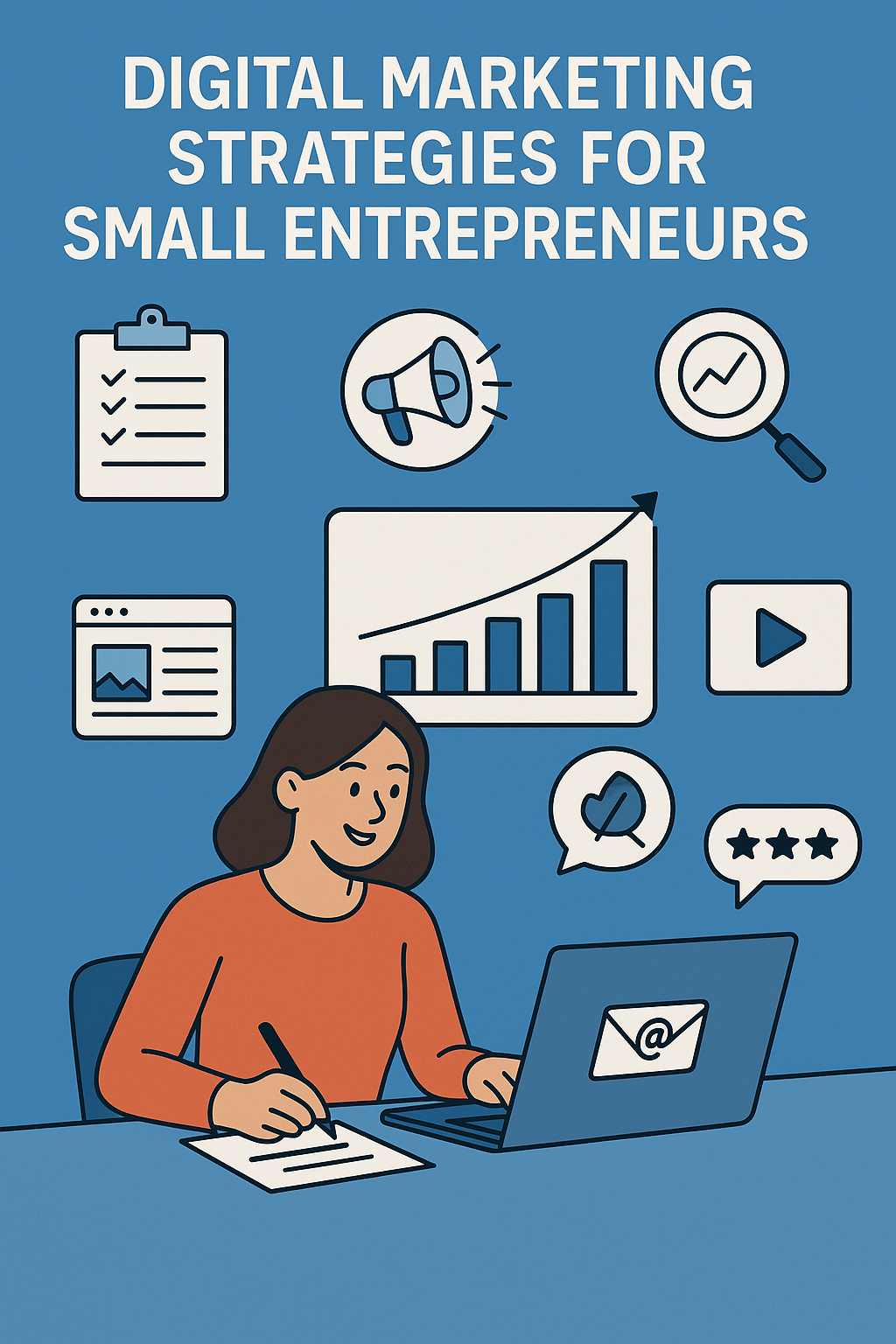For small entrepreneurs, digital marketing is no longer optional—it’s essential. With more consumers spending time online, businesses that fail to use digital tools risk falling behind. The good news is, you don’t need a massive budget to compete. With the right strategies, even small entrepreneurs can reach their ideal customers and grow their businesses effectively.
This article will explore digital marketing strategies tailored for small entrepreneurs, focusing on cost-effective methods that deliver results.
Why Digital Marketing Matters for Small Businesses
Digital marketing allows you to:
- Reach your audience where they spend most of their time.
- Compete with larger companies on a smaller budget.
- Build strong customer relationships through engagement.
- Track results in real time and adjust strategies easily.
Unlike traditional marketing, digital tools give small entrepreneurs measurable results and flexible options.
Strategy 1: Build a Strong Online Presence
The foundation of digital marketing is being visible online.
Key steps:
- Create a professional website that clearly explains your products or services.
- Use consistent branding—colors, fonts, and messaging.
- Ensure your site is mobile-friendly, as most customers browse on smartphones.
- Include clear calls-to-action (e.g., “Buy Now,” “Book a Call,” “Sign Up”).
Your website acts as your digital storefront, so invest time in making it professional and easy to navigate.
Strategy 2: Use Social Media Wisely
Social media is a powerful tool, but many entrepreneurs spread themselves too thin. Instead, focus on platforms where your target audience spends the most time.
Tips:
- Choose 1–2 platforms (e.g., Instagram, LinkedIn, TikTok) based on your audience.
- Post consistently, but focus on quality over quantity.
- Use storytelling to connect with customers on a personal level.
- Engage with followers by responding to comments and messages.
Social media builds relationships and brand awareness, not just sales.
Strategy 3: Invest in Content Marketing
Content marketing is about providing value to your audience through blogs, videos, or guides. This builds trust and positions you as an expert.
Ideas for small entrepreneurs:
- Write blog posts answering common customer questions.
- Share educational videos or tutorials on YouTube.
- Create infographics that simplify complex information.
- Offer free resources (e.g., eBooks, checklists).
The more value you give, the more your audience will trust and remember you.
Strategy 4: Optimize for Search Engines (SEO)
Search Engine Optimization (SEO) helps your website appear in Google searches when people look for your type of product or service.
Basic SEO steps:
- Use relevant keywords in your content.
- Write descriptive page titles and meta descriptions.
- Ensure your site loads quickly and is mobile-friendly.
- Get backlinks by collaborating with other websites or blogs.
Even simple SEO improvements can significantly increase visibility.
Strategy 5: Use Email Marketing to Build Relationships
Email remains one of the most cost-effective marketing channels. Unlike social media, you own your email list.
Tips for success:
- Offer a free incentive (discount, guide, or checklist) to encourage sign-ups.
- Send regular emails with valuable content, not just promotions.
- Personalize your messages to build stronger connections.
- Track open and click rates to improve performance.
Email marketing allows you to nurture leads and turn them into loyal customers.
Strategy 6: Explore Paid Advertising
If you have a small budget, paid ads can deliver quick results. Platforms like Facebook, Instagram, and Google Ads allow you to target specific audiences.
Start small:
- Test ads with a budget of $5–$10 per day.
- Target based on interests, demographics, and behaviors.
- Track performance and adjust campaigns to improve ROI.
Paid ads amplify your reach but should always complement organic strategies.
Strategy 7: Encourage Online Reviews and Testimonials
Word of mouth has gone digital. Online reviews influence customer decisions more than ever.
How to get reviews:
- Ask satisfied customers to leave reviews on Google or social media.
- Share testimonials on your website.
- Respond to all reviews—positive or negative—with professionalism.
Good reviews build trust and make it easier for new customers to choose you.
Strategy 8: Leverage Free Tools and Analytics
Small entrepreneurs don’t need expensive software to get started. Many free tools provide powerful insights.
Recommended tools:
- Google Analytics for website traffic.
- Canva for creating social media graphics.
- Mailchimp (free plan) for email marketing.
- Buffer or Later for scheduling posts.
Using data helps you make smarter decisions and avoid wasting resources.
Final Thoughts: Consistency Beats Perfection
Digital marketing can feel overwhelming, but you don’t need to do everything at once. Start with one or two strategies, stay consistent, and build gradually.
The key to success is not perfection, but persistence. Over time, your digital presence will grow stronger, and your business will attract the right customers.
Small entrepreneurs who embrace digital marketing have a clear advantage in today’s marketplace—so take the first step and start building your strategy today.
